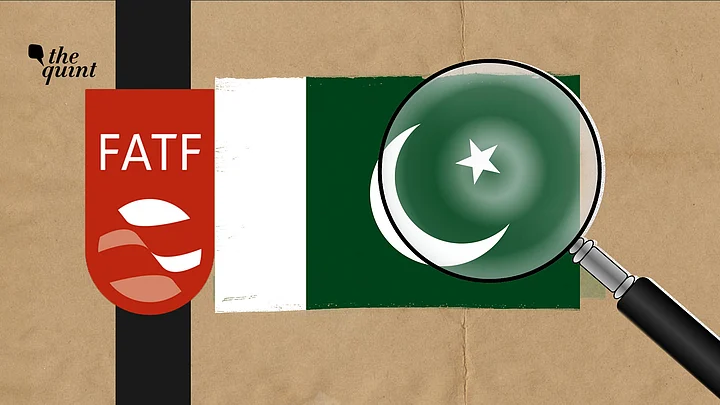Even as the Indian media reported the sentencing of Zaki ur Rehman Lakhvi, the Lashkar-e-Taiba operational chief in Lahore, and of a court in Gujranawala issuing an arrest warrant for Masood Azhar, elusive chief of the Jaish e Mohammad, what was noticeable was the complete silence of the Pakistani press. It was as if neither of these globally known terrorists existed.
That typifies the prevailing sentiment in the country, which is that Pakistan neither trains or shelters terrorists. It’s really just your typical country next door.
India certainly wouldn’t agree, after facing thirty years of terrorism. Neither does the Financial Action Task Force ( FATF), global watchdog for money laundering related to financial crimes, terrorism and missile and nuclear proliferation.
And it is very interested in Pakistan, as also 15 other countries who’s financial systems are under stringent review for financial jugglery. Of these 16, it is only Pakistan, Yemen and Syria, who are under review specifically for terrorist financing. In other words, Pakistan is in the same company as virtually collapsed states, from where instability streams out into the entire region.
Links to Pakistan?
In Pakistan’s case, the instability is global. Don’t forget that nearly every major terrorist attack – including the most recent September 2020 Paris attacks – have had direct links to Pakistan.
In the case of the Paris attacks, the main suspect Ali Hassan was lauded by his father as a hero. Ali in turn, was a follower of Maulana Md Illyas Qadri, founder of the Dawat-e-Islami, which is hugely popular in Punjab with a chain of madrassas across the state. It’s all very well-funded. That’s what worries the FATF, the source and route for money that sends people like Ali, and five others who were arrested along with him, to kill people in other countries.
That also applies to those detained recently. Lashkar chief Hafeez Saeed was sentenced to 15 years in a fourth case against him. He was earlier charged and sent to Kot Lakhpat jail, where he reportedly enjoys special facilities and is always available to meet anxious visitors.
That’s believable. Any video of his innumerable ‘arrests’ have shown him being surrounded by genuflecting policemen. More surprisingly, Zaki Ur Rehman Lakhvi, out on bail since the Mumbai attacks, was sentenced to 15 years, though on a terror financing case.
Mazood Azhar who joyfully claimed the Pulwama attack, and was thereafter mysteriously whisked off to an Army hospital, is at least under threat of arrest. All of these are largely tied to terrorism in Kashmir.
But between them, Jaish and Lashkar ran hundreds of institutions, including schools, colleges, computer camps, and a large network of madrassas, all of which meant lakhs of impressionable youngsters being churned out to wreck havoc against anyone in conflict with their narrow creed.
That’s not just a threat to India. Pakistan has the sixth largest diaspora in the world, not counting 3,00,000 illegal migrants leaving the country each year. Countries with large Pakistani diasporas range from Norway to UAE.
That’s a very large size and area of threat. Realistically, not all are going to commit a terrorist act. But a very large majority will – either knowingly or unknowingly – send money to organisations or individuals willing to commit violence.
You cut the money, and the terrorist organisation will lose interest. As for the individual, his ability to carry out that terrorist act becomes somewhat diminished. He can still hit out with a meat cleaver, as Ali Hassan did. But that’s better than an AK-47 with a cyclic firing rate of 600 rounds a minute. Making that difference is what the FATF is all about.
Will FATF Actually ‘Black List’ the Country?
The question is whether the FATF will actually ‘black list’ Pakistan when it meets, it will decide the outcomes of the various reviews it has done since 2017.
The prognosis is not good. Its September 2020 follow-up report notes that ‘Pakistan has raised a major disagreement with the process, analysis and rating for Recommendation 6’. That’s strange.
Because Recommendation 6 – which is part of the 40 Recommendations of the body – deals with stringent action against all terrorist organisations designated by the United Nations.
That’s the core purpose of the whole exercise, and that’s what Islamabad has strong objections against. If the body decides to ‘black list’ or rather finally identify Pakistan as ‘high risk’, then in its own words it proceeds to ‘call on all members and urges all jurisdictions to apply enhanced due diligence, and in the most serious cases….apply counter-measures to protect the international financial system…’.
In simple language, the entire Pakistani financial system, including its banks, gets cut off from the rest of the world, or gets access after the most stringent examination at every stage. Islamabad will plead that its already tottering economy will collapse. But it won’t. Ironing out financial irregularities may actually get the Pakistani state more income, not less.
Hence, Pakistan’s misconceptions work against itself. First, it feels India is at the bottom of the whole FATF exercise. As can be seen, with so many countries involved in this, it’s not. Second, Pakistanis seem to feel they are being victimised. Actually, the more terrorist money is interdicted, the better it is for the economy when clean money comes overground and into better investment prospects, rather than being used to blow up a plane or a building.
That’s the sober truth. But getting Pakistanis to slew away from the establishment’s terrorist assets is likely to be even more difficult than getting the establishment itself to shut its shop down. It’s a kind of ‘Stockholm syndrome’. An abused state enamoured of the very forces that prey upon it.
(Dr Tara Kartha was Director, National Security Council Secretariat. She is now a Distinguished Fellow at IPCS. She tweets at @kartha_tara. This is an opinion piece and the views expressed above are the author’s own. The Quint neither endorses, nor is responsible for them.)
